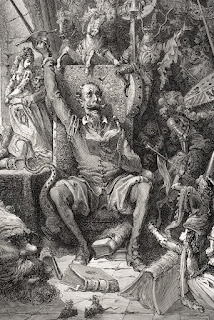"Gaming disorder" is a relatively recent diagnostic invention by psychologists who believe that too much gaming is evidence of a mental illness. According to the World Health Organization,
Gaming disorder is defined in the 11th Revision of the International Classification of Diseases (ICD-11) as a pattern of gaming behavior (“digital-gaming” or “video-gaming”) characterized by impaired control over gaming, increasing priority given to gaming over other activities to the extent that gaming takes precedence over other interests and daily activities, and continuation or escalation of gaming despite the occurrence of negative consequences. (Source)
As an introvert who naturally abhors social interactions, I was immediately skeptical of this newly invented diagnosis, and as an academic who spends a lot of time researching societal impressions of disability, I feared that this diagnosis would be yet another method doctors could potentially use to discriminate against their marginalized patients (which is surprisingly common). I also immediately thought of Don Quixote, a beloved character from the early 17th century who, like many modern gamers, faced discrimination and scorn from his peers simply for enjoying less popular forms of literature.
 |
| Original Don Quixote Illustration by Gustave Dore |
The History and Adventures of the Renowned Don Quixote was first published by Miguel de Cervantes in 1605. If you're like me and can't easily do mental math with big numbers, this was 417 years ago, the same year that William Shakespeare wrote King Lear, Macbeth, and Antony and Cleopatra (source). Yet, even though over four hundred years have passed, Don Quixote's story is remarkably similar to current events and social beliefs, including the idea that video games are a far lesser, cruder media than "high" literature and film. There is no diagnosis that labels readers of books or watchers of film and television as mentally ill, but if you prefer to spend your time playing video games you may be at risk of receiving a mental illness diagnosis (please keep in mind that I do not believe that there is anything wrong with being mentally ill. I do believe that false diagnoses can divert resources from people who really need them, and will muddy the waters when activists are trying so hard to destigmatize mental illness). (This article copyright 2022 Kirsten Rodning.)
In Don Quixote's case, video games wouldn't be invented for a few hundred years, but he was labeled mentally ill by his peers simply for reading the wrong genre of books. Even Cervantes, the author who invented Don Quixote, seems to look down on his protagonist for this reason, writing,
Be it known, therefore, that this said honest gentleman at his leisure hours, which engrossed the greatest part of the year, addicted himself to the reading of books of chivalry, which he perused with such rapture and application, that he not only forgot the pleasures of the chace, but also utterly neglected the management of his estate." (Cervantes 44)
Very early in this large saga, Don Quixote's "friends" decide they are fed up with his literary preferences, and march to his house to burn his books while he is asleep:
[H]is friends came, and demanded of his niece the key of the closet in which those books, the authors of his misfortune, were kept, and she delivering it with great cheerfulness, they went into it in a body, house-keeper and all, and found upwards of an hundred volumes, great and small, extremely well bound [. . .] "There is not one of them, replied the niece, which deserves the least mercy, for they are all full of mischief and deceit. You had better, therefore, throw them out of the window into the court-yard, and there set fire to them." (Cervantes 75)
Don Quixote shows us that society always has, and always will view some forms of media as being more worthy than others. Nowadays the books that Don Quixote loved so much and was hated for are actually considered to be stuffy old classics. So if your friends and relatives look down at you for playing video games, feel free to tell them that you are a modern day Don Quixote, and that one day those games may very well be considered stuffy classics, too.
For more reading on Don Quixote, check out my thesis The Horse and the Heroic Quest linked here.
Works Cited:
“Addictive Behaviours: Gaming Disorder.” World Health Organization, World Health Organization, 22 Oct. 2020, https://www.who.int/news-room/questions-and-answers/item/addictive-behaviours-gaming-disorder.
Cervantes Saavedra, Miguel. The History and Adventures of the Renowned Don Quixote. Translated by T. Smollett, Modern Library, 2001.









No comments